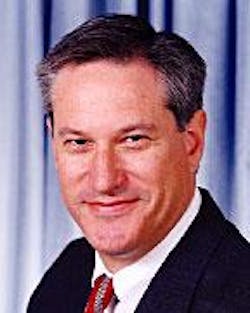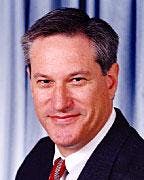SPE’s Mark Rubin: OTC an opportunity for industry to tell public its story on environment
The 34th annual Offshore Technology Conference opens this week in a new facility in Houston and under a new executive manager for the first time in nearly 3 decades.
Heading the permanent OTC staff this year is Mark A. Rubin, who succeeded Dan Adamson late last year as executive director of the Society of Petroleum Engineers, based in Dallas, and executive manager of the oil and natural gas industry’s biggest industrial conference and trade show (OGJ Online, Nov. 12, 2001).
Adamson retired in late September after 26 years with SPE. Planning and preparation for this year’s 2002 OTC was well under way long before Rubin was recruited for his new job. SPE is one of 12 industry associations that cosponsor OTC each year.
However, in a preconference interview, Rubin told OGJ he isn’t nervous about his new responsibility. "This is my first opportunity to be involved in helping organize OTC, and clearly I have great deal to learn," he said. "Dan was instrumental in developing the concept of OTC and in putting it together. But he also put together a good staff with a wealth of experience, and that makes my job a lot easier. I’m depending on them. They know how the pieces fit together."
Confidence in staff
He said, "I already had confidence in the SPE staff when I took this job, because of what I had seen of their work at earlier OTCs and SPE meetings. Since then, my confidence has only grown."
As a petroleum engineer and longtime SPE member, Rubin is well acquainted with the philosophy of not fixing what isn’t broken. "OTC is already successful. At this point I don’t see any reason to change its existing goals. My only goal is to continue that success," he said. "OTC is by far the biggest conference in the oil and gas industry and one of the biggest in any industry. It has an excellent technology program and excellent exhibits. With all the ups and downs of the industry, OTC continues to be a success."
The exchange of information on projects and technology has always been a key element of OTC technical sessions. Rubin wants to see those lines of communication extended outside the industry to the ultimate consumers of oil and gas in the general public.
"As participants in this industry, we all have to be part of the effort to tell the industry’s story. We need all phases of the industry out there telling that story," he said.
"There will always be critics, but our environmental record is nothing to be ashamed of. We have proven we can develop oil and gas throughout the world without harming the environment. Aquatic life in the mature exploration and development areas of the Gulf of Mexico centers on offshore platforms. When people take an objective look at the industry, they will see that," Rubin said.
As for the industry’s future, he said, "Over the past several years, there has been a very strong increase in new technology for offshore, not just in the Gulf of Mexico but in other parts of the world as well. I don’t see any reason that trend won’t continue. We have to develop even more advanced technology if we are going to tap the remaining oil and gas in mature areas that have already been explored."
Rubin also foresees a strengthened role for natural gas among energy supplies worldwide. "Everybody in the industry is looking at various parts of the world where they can bring gas to market or monetize it in a local market. Clearly, there’s no end in sight for that trend," he said.
Differences
After more than 30 years in the former Astrodomain complex (now Reliant Arena and Reliant Hall), OTC moved this year to Reliant Center, a new 1.4 million sq ft sports and convention facility that opened in March adjacent the former meeting site.
"We have a new venue this year, a beautiful new facility. OTC is only the second major event to be held in the new stadium since it opened," said Rubin.
Physical differences between the new and former facilities will have a significant impact on the mix of exhibitors and the look of exhibition areas at this year’s OTC. Because of the bigger facility, all OTC activities will be contained within the same building this year for the first time since the conference moved from its original downtown Houston site to the old Astrodomain complex for its third annual meeting in 1971.
Moreover, Rubin said, "Previously all the exhibition booths with tall features had to be grouped together in the center of the old Astrohall, because that building’s ceiling sloped [from a central high point] down to walls. Taller ceilings in the new stadium allow for more dispersal of those taller booths this year."
The 4-day event is expected to attract more than 45,000 oil and gas industry professionals from a large number of countries. "It’s where you know people in this industry are going to be this weekthe people who you need to see and to talk to, so you can plan opportunities to get together," said Rubin.
Security concerns
In the wake of the Sept. 11, 2001, terrorist attacks in New York City and Washington, DC, Rubin acknowledged, "We have beefed up security. We’ve been working with local government agencies and law enforcement authorities on that, and we’ve taken the new [safety] environment into consideration in planning security. It really is a new ballgame for events like this."
However, he said, "Most of the additional security will be behind the scenes. Those attending OTC may be aware of more emphasis on checking the identity and badges of those entering the building and meetings. But there shouldn’t be any significant restraints to the movement of participants at the conference."
Rubin said, "It’s hard to say yet if OTC attendance may be affected by the aftermath of Sept. 11. There seemed to be some drop-off in business travel immediately after the attacks, but it has since picked up. We haven’t seen much effect at other SPE events since then."
Besides, he said, "People in this industry have never been afraid of taking risks."
Career highlights
Mark A. Rubin was appointed executive director of the Society of Petroleum Engineers on Aug. 28, 2001. In that position, he oversees operations by 120 staff members and 6 associate executive directors in SPE’s offices in Dallas, Houston, Kuala Lumpur, and London. He also doubles as executive manager of the annual Offshore Technology Conference, which is cosponsored by SPE.
Employment
- American Petroleum Institute, 1988-2001. Rubin joined API’s upstream operations in Dallas and subsequently was employed in a series of management positions, working on federal regulatory and legislative matters and international standardization activities, culminating in his appointment as director of API’s upstream segment in Washington, DC, and representative of API to the International Association of Oil & Gas Producers.
- Buttes Resources Co., Dallas, petroleum engineer, 1987-88.
- Unocal Corp., in various petroleum-engineering assignments in Houston and East Texas, 1981-87.
Education
- BS degree in petroleum engineering from Texas A&M University, College Station, Tex.
- MBA from Southern Methodist University, Dallas.
Organizations
- SPE member since 1979.

